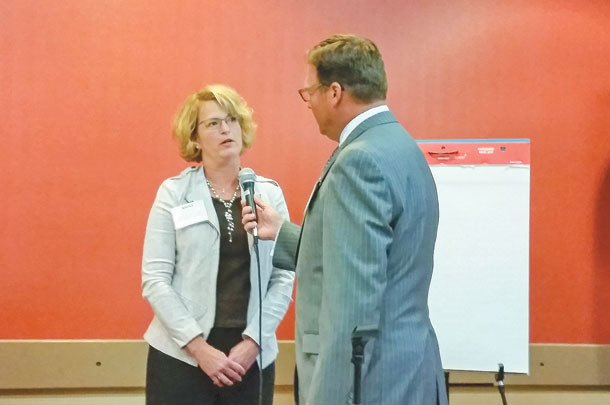Dairy farmer leaders of the national dairy checkoff learned a lot from watching the United Kingdom struggle to manage crisis communications in the aftermath of BSE and foot and mouth disease outbreaks in 2001.
This international animal health crisis served as a wake-up call to U.S. agriculture – and especially dairy farmers. Farmer checkoff leaders directed Dairy Management Inc. (DMI), which manages the national dairy checkoff, to build a crisis communications preparedness program that would help the industry think about the unthinkable.
This work is critical to protecting consumer confidence in dairy foods, farmers and the dairy community. Research shows organizations that prepare for a crisis recover much faster than those that do not.
Over the last several years, national and local checkoff staff have built a crisis preparedness communications program with collaboration from other industry organizations including the International Dairy Foods Association, Milk Processor Education Program, National Milk Producers Federation and the U.S. Dairy Export Council. State and regional checkoff organizations also host crisis drills for their farmers and industry allies.
DMI’s plan is much more than a detailed protocol of how to manage communications in a crisis. During these intense drills, participants engage in realistic mock scenarios.
Through the years, the drills have focused on a variety of scenarios, including:
- Outbreaks of animal diseases, such as foot and mouth disease
- Multi-state occurrences of food safety and food-borne illnesses linked to dairy
- Bioterrorism attacks aimed at the milk supply and dairy farms
And showing that the industry truly should be prepared for anything, one training session even demonstrated how natural disasters could impact dairy by focusing on a tornado that hit a nuclear power plant located near farms.
Undercover video scenario
In 2016, scenarios focused on an animal rights group releasing an undercover video that showed alleged animal abuse. More than 240 people attended three two-day drills. The 2017 training drills will focus on food safety.

Beyond farmers and national and local checkoff staff members, the trainings represent the many industry members who would be affected in a crisis, including veterinarians, co-op leaders, brand representatives, ingredient suppliers and others.
In the last two years, 300-plus food companies, including Costco, Chobani, Starbucks, Kraft Heinz, Sargento, Land O’Lakes, Meijer, General Mills, Culver’s, Baskin-Robbins and Food Lion have participated.
Additionally, officials from the Department of Homeland Security and the FDA, plus various leaders of state departments of agriculture, have been trained.
Tricia Sheehan, who leads the crisis trainings for DMI, said the drills work to get the right people together before a crisis happens. During the drills, participants create solutions to manage the scenario as anxiety builds and unexpected challenges are introduced throughout the day.
One important aspect is the inclusion of social media activity. Sheehan said the training incorporates a social media simulator to show how information – and misinformation – can quickly spread.
“You don’t have prep time,” Sheehan said. “The drill unfolds in real time, just as a real crisis would. You don’t stop for lunch; you don’t have time to check your day-to-day messages – you’re immersed in what’s happening at the moment.”
Making industry connections
Sheehan said one benefit of the drills is getting people from different parts of the industry together to better understand how a crisis impacts each other.
“We have people across the value chain working together as a team,” she said. “So a farmer can say, ‘I understand why and how a food company would respond this way.’ And vice versa: Food companies see what a farmer has to deal with in a crisis. You see good conversations happening across the room that otherwise may not have happened if not for these trainings.”
Sheehan said that while the drills are intense, the response is overwhelmingly positive.
“One participant said, ‘I loved it but I hated it at the same time because it was so intense, but it helped me understand what I need to work on,’” Sheehan said. “A dairy farmer talked about how the training taught him to think on his feet in a difficult situation and to see how the decisions he made on his farm affect so many others.
“We all like to think we are ready for a crisis, but until you experience one in a drill, you really don’t know.” ![]()
PHOTO 1: Crisis drill participants work as a group to find solutions to manage the unexpected challenges that unfold during the mock event.
PHOTO 2: Anne Goetze of the Oregon Dairy and Nutrition Council practices answering critical questions from a mock media member during a crisis drill. Courtesy photos.
Your Dairy Checkoff in Action – The following update is provided by Dairy Management Inc. (DMI), which manages the national dairy checkoff program on behalf of America’s dairy producers and dairy importers. DMI is the domestic and international planning and management organization responsible for increasing sales of and demand for dairy products and ingredients.



